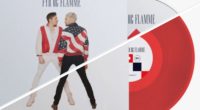
On her new album Birthe Kjær is showing a rather new side of herself when she diggs into 12 well known international classics to give them new life. For Birthe this album is a dream come true, but is she too much out of her comfort zone here or does she have what it takes?
Birthe Kjær who represented Denmark at the 1989 Eurovision Song Contest with the song Vi Maler Byen Rød, which came third, celebrated her 40 years anniversary on the music scene a couple of years ago. She is mainly known for pop songs in Danish so these 12 classics in English sung in Swing style with a Big Band orchestra would be rather much out of her comfort zone.
1. The album kicks off with Smile, which is originally from a Charlie Chaplin film from 1936 where it was used in its instrumental version. In 1954 lyrics was written, but it wasn’t recorded until 1964 by Nat King Cole. After that it has however been covered a lot of times – and now also by Birthe Kjær although this isn’t a version that will become famous. The Big Band orchestra here totally kills it. She might have been able to pull it off with a smaller orchestra, but this opening song is not good.
2. When we continue to Such A Night, originally by The Drifters, but probably most famous by Elvis Presley, it gets significantly better. It is put up in a 1920’s Harlem night club style and is actually quite refreshing.
3. You’re Nobody Till Somebody Loves You is most known by Dean Martin from 1965, but actually dates back to 1944. If you picture yourself a hanger from the second world war where a Big Band orchestra is playing on the stage, young men in uniform dancing with their girlsfriends and hundreds of ballons dropping down on them, then you are in the right mood for this song. It is a really nice version actually, but SwingSisters as choir here would have suited it.
4. And now it gets interesting. Fourth song is the very well known As Time Goes By from the just as much well known film Casablanca. This could have killed her totally as it really isn’t a song for a woman, but it gets somewhat saved by a really good arrangement. The ending however is just simply not good.
5. For Once In My Life is next track. It was recorded in a slower version by Jean DuShon in 1967, but already the year after a more uptempo version of it became famous by Stevie Wonder. Birthe’s version starts out quite quietly, but changes tempo as the Big Band orchestra joins in. She actually cope with this quite well.
6. We had Casablanca earlier and now we move on to Cabaret from 1972 starring Liza Minnelli singing, among others, Maybe This Time, which Birthe Kjær now throws herself in to. The arrangement of this version is made quite good, but it becomes a bit too sweet in Birthe’s version. Her voice simply lacks the edge Liza Minnelli gave it.
7. We move on to Edit Piaf’s famous La Vie En Rose. At first you ask why Birthe sings it in English and you actually get a bit annoyed, but about half way through she turns into French, which immidiately makes the song so much better. The harmonica on this song helps towards making it quite a good song, aside from the English beginning.
8. On A Slowboad To China stands out as the best song on this album. It is more pop-ish than any of the others and therefore also what she appears more comfortable with. It is a really fresh version, but about half way through a few words in Danish slips in, which is not good, but not so much that it destroys the impression of a really version from Birthe Kjær.
9. When I Fall In Love is originally from 1952 recorded by Doris Day, but most famous in its 1956 version by Nat King Cole. It is a classic love ballad, which Birthe here delivers quite true to the original. The simple arrangement suits her voice quite well.
10. We have another nice arrangement on Orange Coloured Sky, but this song doesn’t quite suit her. On the faster almost rap parts she gets into problems with her voice having problems keeping up. It is a fresh try, but it is more a song for someone younger.
11. You Don’t Have To Say You Love Me is a love song for the more mature audience and significantly more suitable for her voice as infact it fits her really well. This version is absolutely belivable and appear quite honest in Birthe’s version, really well done of the song that originally was sung by Dusty Springfield, but also have been recorded by f.ex Elvis Presley.
12. We end with one of the biggest classics; My Way. The last song is quite true to the 1 million other versions we have heard of this song. She does a fine job, doesn’t add anything new to the song, but doesn’t take anything away from it either. It is however quite suitable as ending track on an album where Birthe Kjær did it her way.




















